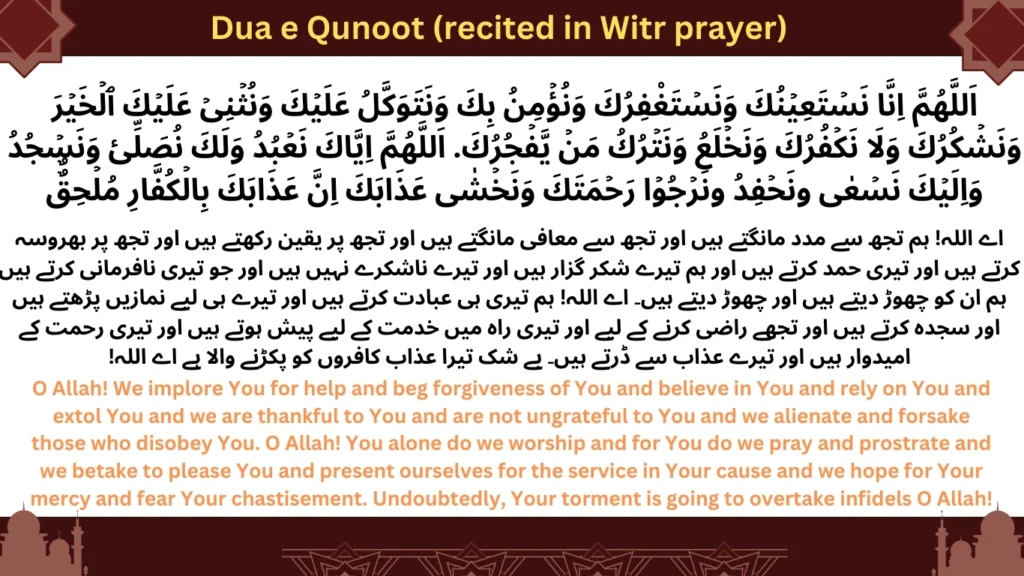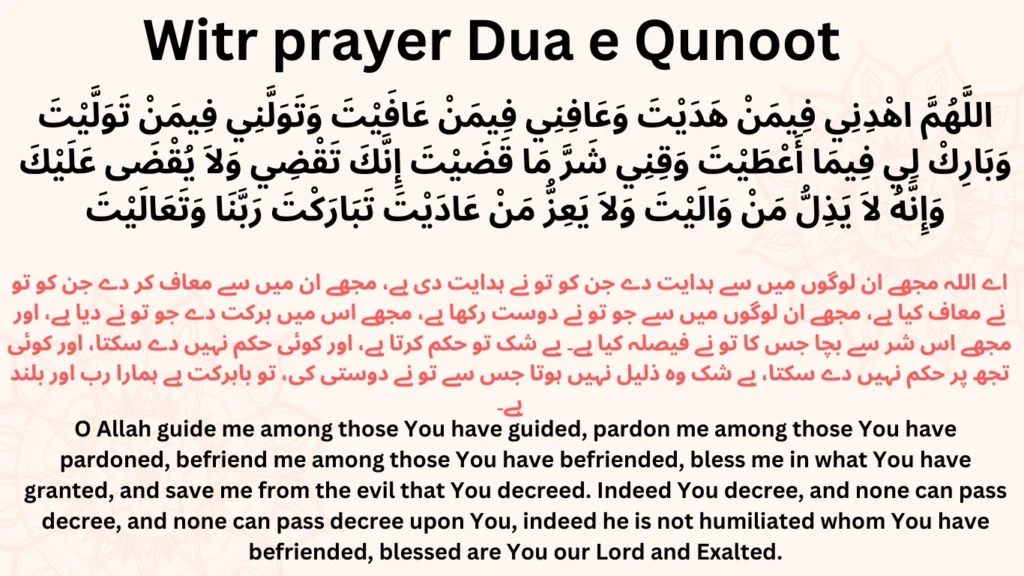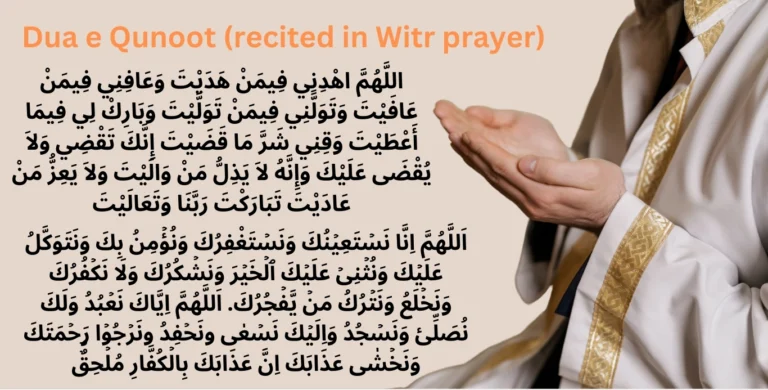In the serene moments of prayer, a Muslim seeks a deep connection with Allah. Among the various supplications recited during Salah (prayer), Dua e Qunoot holds a special place, especially in the Witr prayer. This blog will guide you through the significance of Dua e Qunoot, provide insights into the Witr prayer, and answer the burning question is Witr Wajib or Sunnah?
Witr Dua Dua e Qunoot (Hanafi)

Witr Dua Dua e Qunoot (Shafi)

Dua e Qunoot is a special supplication recited during the Witr prayer, particularly in the last Rak’ah (unit) of the prayer. The term “Qunoot” in Arabic means to stand in prayer with humility and devotion. This supplication is a heartfelt plea to Allah, seeking His guidance, protection, and blessings.
Muslims recite Dua e Qunoot during the Witr prayer to seek Allah’s mercy and protection from misguidance and calamities. The words of this Dua resonate deeply with believers, providing comfort and strength in times of need.
Significance of Dua e Qunoot in Witr Prayer
The Dua e Qunoot holds immense significance in the Witr prayer as it embodies the essence of seeking Allah’s guidance and mercy. It is a moment of reflection and devotion, allowing believers to connect with their Creator on a deeper level. Reciting this supplication regularly can bring immense spiritual benefits and a sense of inner peace.
The Witr Prayer
What is Witr Prayer?
The Witr prayer is an essential part of a Muslim’s daily prayers, typically performed after the Isha (night) prayer. The word “Witr” means odd, and this prayer consists of an odd number of Rak’ahs, usually three. It is a Sunnah Mu’akkadah (emphasized Sunnah) and holds significant importance in the daily routine of Muslims.
The Structure of Witr Prayer
The Witr prayer can be performed in different ways, but the most common practice is to perform it with three Rak’ahs. Here is a step-by-step guide to performing the Witr prayer:
- Start with the intention (Niyyah) of performing the Witr prayer.
- Recite Surah Al-Fatiha followed by another Surah in the first Rak’ah.
- Repeat the same for the second Rak’ah.
- In the third Rak’ah, recite Surah Al-Fatiha and another Surah, followed by the Dua e Qunoot before proceeding to Ruku (bowing).
This structure ensures that the Witr prayer is performed with devotion and sincerity, seeking Allah’s guidance and mercy.
Importance of Witr Prayer in Daily Routine
The Witr prayer holds immense importance in a Muslim’s daily routine as it serves as a means of seeking Allah’s forgiveness and protection before the day’s end. It is a moment of introspection and reflection, allowing believers to strengthen their connection with Allah.
Is Witr Wajib or Sunnah?
Understanding the Term Wajib
In Islamic jurisprudence, Wajib refers to actions that are obligatory and must be performed by Muslims. Failure to perform a Wajib act can lead to sin and accountability.
The Status of Witr Prayer
The status of the Witr prayer varies among different schools of thought in Islam. According to the Hanafi school, the Witr prayer is considered Wajib (obligatory). This means that neglecting the Witr prayer intentionally without a valid reason can lead to sin.
On the other hand, other schools of thought, such as the Shafi’i, Maliki, and Hanbali, consider the Witr prayer as Sunnah Mu’akkadah (emphasized Sunnah). While it is highly recommended and carries great spiritual rewards, it is not obligatory, and missing it does not incur sin.
The Consensus and Practicality
Despite the differences in opinion, it is widely agreed upon that the Witr prayer holds significant importance and should be performed regularly. The Prophet Muhammad (peace be upon him) emphasized the virtues of the Witr prayer, making it an integral part of a Muslim’s nightly routine.
How to Incorporate Dua e Qunoot and Witr into Your Routine
Establishing a Nightly Routine
To incorporate Dua e Qunoot and the Witr prayer into your routine, it is essential to establish a consistent nightly prayer habit. Set aside a specific time after the Isha prayer to perform the Witr prayer with devotion and sincerity.
Understanding the Words of Dua e Qunoot
Taking the time to understand the meaning and significance of the words in Dua e Qunoot can deepen your connection with this supplication. Reflect on the words and their implications, allowing them to resonate with your heart and soul.
Seeking Guidance and Support
If you are new to incorporating Dua e Qunoot and the Witr prayer into your routine, seek guidance and support from knowledgeable individuals or religious scholars. They can provide valuable insights and tips to help you establish a strong and meaningful prayer routine.
Benefits of Reciting Dua e Qunoot Regularly
Spiritual Benefits
Reciting Dua e Qunoot regularly can bring numerous spiritual benefits, including a stronger connection with Allah, increased humility, and a sense of inner peace. It serves as a reminder of Allah’s mercy and protection, providing comfort and solace in times of difficulty.
Mental and Emotional Benefits
The practice of reciting Dua e Qunoot can also have positive effects on mental and emotional well-being. It encourages mindfulness, gratitude, and reflection, promoting a sense of calm and tranquility.
Community and Social Benefits
Regularly reciting Dua e Qunoot and performing the Witr prayer can foster a sense of community and belonging among Muslims. It reinforces shared values and beliefs, strengthening the bonds of brotherhood and sisterhood in faith.
Frequently Asked Questions
Can Dua e Qunoot be recited in other prayers?
While Dua e Qunoot is specifically associated with the Witr prayer, it can also be recited in other prayers, particularly during times of distress or seeking Allah’s guidance and protection.
Can the Witr prayer be performed in congregation?
Yes, the Witr prayer can be performed in congregation, especially during Ramadan. It is a common practice to perform the Witr prayer in congregation during the Taraweeh prayers in the holy month of Ramadan.
What if I forget to recite Dua e Qunoot during Witr?
If you forget to recite Dua e Qunoot during the Witr prayer, it does not invalidate your prayer. You can continue with the prayer and seek Allah’s forgiveness for any unintentional mistakes.
Tips for Enhancing Your Witr Prayer Experience
Create a Peaceful Environment
Creating a peaceful and distraction-free environment can enhance your Witr prayer experience. Find a quiet space, free from interruptions, where you can focus solely on your connection with Allah.
Use a Prayer Mat and Tasbih
Using a prayer mat and Tasbih (prayer beads) can help create a sense of reverence and mindfulness during your Witr prayer. The prayer mat provides a dedicated space for prayer, while the Tasbih can aid in counting the recitations and supplications.
Reflect on the Meaning of the Supplications
Taking the time to reflect on the meaning of the supplications recited during the Witr prayer can deepen your understanding and connection with the prayer. Contemplate the significance of each word and its implications in your life.
Common Mistakes to Avoid in Witr Prayer
Neglecting the Witr Prayer
One of the common mistakes is neglecting the Witr prayer altogether. It is essential to make a conscious effort to include the Witr prayer in your nightly routine, recognizing its significance and spiritual benefits.
Rushing Through the Prayer
Another common mistake is rushing through the Witr prayer without proper focus and devotion. Take your time to perform each step of the prayer with mindfulness and sincerity, allowing yourself to connect with Allah on a deeper level.
Ignoring the Meaning of the Supplications
Reciting the supplications without understanding their meaning can diminish the spiritual impact of the prayer. Make an effort to learn the meanings of the supplications and reflect on their significance during the Witr prayer.
Conclusion
The Dua e Qunoot and the Witr prayer hold immense significance in the daily routine of Muslims. The Dua e Qunoot serves as a heartfelt supplication, seeking Allah’s guidance, protection, and blessings. The Witr prayer, whether considered Wajib or Sunnah, is an essential part of a Muslim’s nightly routine, offering spiritual, mental, and emotional benefits.
By incorporating Dua e Qunoot and the Witr prayer into your routine, you can strengthen your connection with Allah, foster a sense of community, and experience inner peace. Remember to create a peaceful environment, use a prayer mat and Tasbih, and reflect on the meaning of the supplications to enhance your prayer experience.

